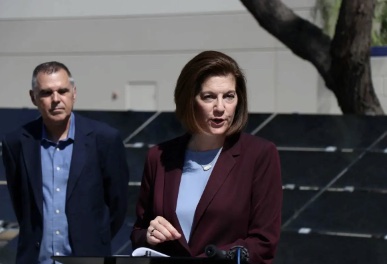Cortez Masto touts clean energy boost thanks to inflation bill
from the Las Vegas Review Journal
Labor and environmental organizations gathered with Sen. Catherine Cortez Masto on Friday to tout the recently passed Inflation Reduction Act and how it will benefit the state’s clean energy sector.
“All of the focus that we have done to lean into this clean energy economy, that is a long-term investment for Nevada. It’s not just one year, two years, this is 10 years. This is long term,” Cortez Masto said.
Officials from the Nevada Conservation League, Environmental Defense Fund and the International Brotherhood of Electrical Workers were also at the Matt Firmenich IBEW Training Facility in east Las Vegas to discuss how the act will improve Nevada’s economy.
Broadly, the bill earmarks $369 billion for climate change and clean energy programs, which includes tax incentives for electric vehicles, solar panels and technology that helps reduce carbon emissions. It will also raise $737 billion in government revenue through changes to the tax system including a minimum 15 percent corporate tax, a 1 percent stock buyback tax and drug pricing reform.
The White House released estimates showing Nevada will receive $2.7 billion for renewable energy projects by 2030, which could boost the industry’s labor force that currently has more than 32,000 workers.
Cortez Masto said the bill would reduce the federal deficit by $300 billion in the next few years, though the Congressional Budget Office reported earlier this month that the deficit will decline $102 billion by 2031.
James Halsey, business manager for IBEW Local 357, said the legislation will help the solar industry and expand the union, which has an estimated 4,000 members.
“This Inflation Reduction Act will create more opportunities for us to bring in new members and new apprentices and have new opportunities here in Southern Nevada,” Halsey said.
Halsey wouldn’t speculate on how many new union members it could gain, saying that future growth of the union heavily depends on the amount of electric projects in the state and on the direction of the economy.
The act offers a federal tax credit covering up to 30 percent of installation costs for solar panels and home energy-efficient projects. It uses tax credits to cover 30 percent of community solar projects. It could have a large impact on Nevada since the state has the most potential to add solar energy, according to the U.S. Energy Information Administration.
Yazmyn Pelaez, communications associate for the Nevada Conservation League, said the Inflation Reduction Act is one of the most “consequential” climate-related bills in American history, but more work needs to be done.
“More can be done to support and foster the growth of our state’s impressive clean and renewable energy economy,” Pelaez said.
It’s the second time this week that Cortez Masto praised the Inflation Reduction Act. On Tuesday, she spoke at the 26th annual Lake Tahoe Summit, hosted by fellow Democrat Sen. Jacky Rosen.
But in Las Vegas, Cortez Masto also used the opportunity highlight the Creating Helpful Incentives to Produce Semiconductors and Science Act of 2022, or CHIPS, providing $52.7 billion in subsidies to boost U.S. chip production as well as the 2021 bipartisan $1.2 billion infrastructure bill.
“(These bills) allow Nevada continue to position itself to be a leader in this clean energy economy and this innovation economy,” said Cortez Masto, who is running for reelection in November.
However, Cortez Masto’s challenger, Republican nominee Adam Laxalt, thinks the opposite. When contacted, the Laxalt campaign doubled down and referenced previous statements that cited analysis by the Joint Committee on Taxation and others.
“This is quite literally the last thing Nevada families and small businesses need,” Laxalt said in a statement. “Senator Cortez Masto had a chance to get serious and help pass bipartisan legislation to secure our border, lower gas prices, and provide real, much-needed relief to the millions of Nevadans struggling to get by. Instead, she enthusiastically rubber stamped a reckless $700 billion package.”
Cortez Masto said she was disappointed by the Republican response to the Inflation Reduction Act, citing the current state of America’s environment and the threat of climate change.
“Every Nevadan, you just walk out your door, and you know the climate is changing,” Cortez Masto said. “We have extreme weather, climate crisis, from the drought to the wildfires to everything that we have here, that has the benefit of really approaching this clean energy economy and being a part of it to reduce our emissions.”
Contact Sean Hemmersmeier at shemmersmeier@reviewjournal.com. Follow @seanhemmers34 on Twitter.

